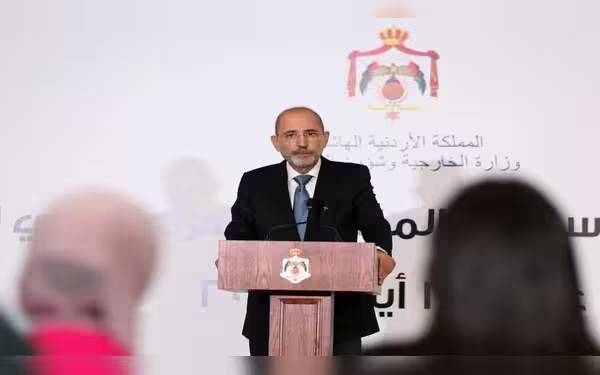Saturday, November 16, 2024 05:53 PM
Jordan Warns Netanyahu's Actions Could Ignite Regional War
- Jordan's Safadi warns of impending regional war.
- Israeli airstrikes target Hezbollah in Beirut.
- Netanyahu's silence on Palestine hinders peace efforts.
 Image Credits: gnnhd
Image Credits: gnnhdJordan's foreign minister warns Netanyahu's actions could lead to regional war, emphasizing the need for addressing the Palestinian issue.
In recent developments, tensions in the Middle East have escalated significantly, with Jordan's foreign minister, Ayman Safadi, expressing grave concerns over Israeli Prime Minister Benjamin Netanyahu's actions. Safadi stated that Netanyahu is leading the region towards a potential full-scale war, emphasizing the urgent need to halt his government's aggressive policies. He remarked, "It is time to face the truth, and the truth is, unless Netanyahu is stopped, unless this government is stopped, war will encompass all of us." This statement was made just before a crucial United Nations Security Council meeting focused on the ongoing crisis in Gaza.
On the same day, Israeli airstrikes rattled Beirut, targeting what the Israeli military described as Hezbollah's central headquarters in the southern suburbs of the Lebanese capital. This military action has raised alarms among regional leaders, including Saudi Foreign Minister Prince Faisal bin Farhan Al Saud. He warned that such airstrikes could lead to a situation spiraling out of control, stating, "We believe very, very, very strongly that a ceasefire is necessary, that the guns are not going to solve anything, that we need to move towards a peace in our region, and that peace is firmly rooted in addressing the Palestinian issue."
During a speech at the United Nations General Assembly, Netanyahu discussed his aspirations for normalizing relations with Saudi Arabia but notably failed to mention the Palestinian issue. This omission did not go unnoticed, as bin Farhan pointed out, "It was interesting to see that Prime Minister Netanyahu, in his words, in quite a lengthy statement about the issue, not once mentioned Palestine, not once mentioned the Palestinians." This lack of acknowledgment is seen as a significant barrier to achieving lasting peace in the region.
Safadi further emphasized the importance of addressing the Palestinian issue, stating, "Without addressing the issue of Palestine, it will not be able, it will not be possible, to reach the dual potential of regional peace and stability." He also highlighted that there would be no normalization of relations without a resolution to the Palestinian conflict, asserting, "I can tell you here very unequivocally, all of us are willing to right now, guarantee the security of Israel in the context of Israel ending the occupation and allowing for the emergence of a Palestinian state, independent state."
The current situation in the Middle East is precarious, with the potential for conflict looming large. The calls for a ceasefire and a renewed focus on the Palestinian issue are critical for achieving peace and stability in the region. As leaders navigate these complex dynamics, it is essential to remember that lasting solutions require dialogue, understanding, and a commitment to addressing the root causes of conflict. The world watches closely, hoping for a resolution that brings peace to all parties involved.













